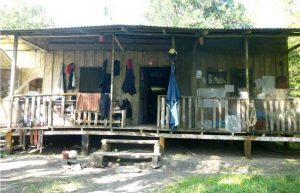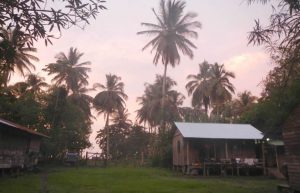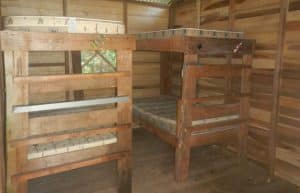GoEco > Central America > Costa Rica > Jaguar Research and Conservation

Please Note: This program is temporarily unavailable. Check out our alternative programs in Central America or schedule a one-on-one call with one of our expert volunteer advisors.
Participate in professional wildlife expeditions that aim to collect data on the local jaguar population. This project is ideal for volunteers who wish to gain experience in wildlife research and conservation methods.
Program Highlights:
Your Schedule at a Glance (Minimum two-week commitment):
Arrival Day, Saturday: Arrive at Juan Santamaría International Airport (SJO) on time to make it to the project team meeting point in the morning. Many volunteers choose to arrive at least a day earlier (or more) and make it to the meeting point on Saturday to start the program.
Week One: Your first week of the project will consist of training and skill building in wildlife research. You will learn how to identify tracks, complete surveys accurately as well as how to evaluate the data.
Week Two: With your training complete, you are now ready to put your skills into practice and conduct the required research. You may participate in biodiversity assessment surveys, amphibian surveying and more, in addition to the jaguar tracking and turtle care.
Remaining Weeks: The remaining weeks will follow a similar schedule of participating in various research projects. You will also have one to two days off per week, which you can use to rest and relax on the beautiful Costa Rican beaches. Departures are on a Saturday.
Long term & Short term internships are also available. For the long term internships the focus is on Wildlife Conservation; the first 3 months of the internship is the same as the short-term volunteers and includes a certificate in Leadership Training. The second half of the long term internship is a work placement with one of the project partners or as field staff, depending on needs at the time. Inquire for more information.







What’s Included





What’s not Included
Flights, visas (if required), travel health insurance, international and domestic airport taxes, personal expenses.

This project takes place in the rainforest of Tortuguero National Park on the Caribbean (eastern) side of Costa Rica. The volunteer camp is accessible only by boat and foot, and is nestled in a coconut plantation only 50 meters from the beach!

At the core, the goal of this project is the ongoing completion of biological surveys that contribute to increased scientific knowledge and the overall conservation efforts of this particular area. In the field you will work collecting important data and learn a vast array of research skills. With many dawn patrols in the plan, you will get to see some spectacular sunrises on Totrugero’s breathtaking Caribbean beaches. At the station you will learn the technical side of working in the field, analyzing, processing and recording data.
The first two days are spent running through introductions to base, GVI and also Health & Safety procedures.For volunteers staying two weeks, training for the jaguar and other survey projects will be given during the first week. Volunteers are expected to participate in other surveys as well. They will also be doing the ‘jag walk’ (15 mile walk) on the Thursday of the second week.
Although jaguar-related research activities will your main focus, during your time you will also gain a holistic understanding of the Costa Rican rainforest and its ecosystem by conducting other important research, which may include studies of turtles (seasonal), aquatic birds, amphibian monitoring and biological assessment surveys. Volunteers will go on two surveys a day, with the exception of Friday afternoons and Saturdays which is free time. Once a week volunteers will also be on kitchen duty.
A day in the life of a volunteer:
Please note that the emphasis of the program can change according to the time of year.
Also please note that the work you will be doing will contribute to jaguar conservation in the area, however, a real-life jaguar sighting is quite rare and not guaranteed.









Please take note of this project’s minimum requirements:
Important notes:
All volunteers must hold a Scientific Permit. We will obtain the permit on your behalf; however, you must submit the following materials following registration:
Volunteers must apply at least four weeks prior to their desired start date to allow for sufficient time to process the permit.

Project Orientation (included)
Upon your arrival, expedition staff will present a structured training program that is given over the course of the first few days. A brief but intensive training period prepares volunteers to begin working on the research programs, after which time you will continue to learn, with each survey becoming increasingly experienced.
Further Traveling Opportunities:
Costa Rica is an amazing country with an abundance of travel opportunities further afield with the following just a snapshot of the many possibilities!
Given your isolated location, a lot of your down time will be spent on base, the rainforest is not a place to go wandering! However there are still some possibilities in the immediate area for you to make the most of your time in Costa Rica. You can visit Tortuguero Village on the weekends, browse its small souvenir shops, visit the delicious bakery and just watch the world go lazily by.
For longer term volunteers on long weekend breaks, you could decide to head off base and further explore the Caribbean region. Hiking, snorkeling, fishing, or canopy and zip-line tours are just some of the activities that are possible in the area. For something a bit more intense, you could raft on the white waters of the famous Pacuare River on class III to IV rapids over the course of 1- or 2-day trips. And if the adventure activities are not for you, then simply relax in a laid back Caribbean village!
Admire the famous and active Volcan Arenal from a distance and relax in the natural hot springs; surf the Salsa Brava – a hotspot of the Caribbean for the advanced surfer; ride horseback on the beach in Puerto Viejo or simply enjoy miles and miles of beautiful beaches kissed by palm trees; spot migratory raptor birds in the Talamanca Mountains and visit indigenous villages to learn more about their amazing culture; discover the cloud forest at Monteverde, visit the hummingbird gallery, enjoy the locally made ice cream and other fresh dairy products or walk among the treetops on the hanging bridges; enjoy the organized wildlife tours of Braulio Carrillo National Park; travel across the country to discover the beautiful Pacific Coast with its hidden white sand beaches; visit Volcan Irazu and discover coffee farms on the way back to San Jose; back in the capital, visit the Gold Museum or the Jade Museum, attend a play in one of the numerous theatres or take in the Latin American vibe with its lively nightlife.

© 2022 GOECO | All rights reserved
Develop & Design | Msite